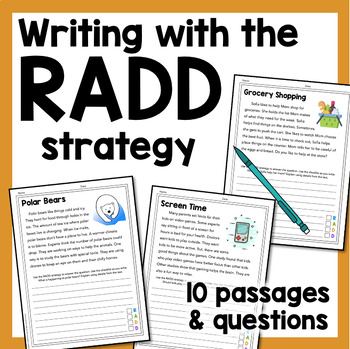RADD Writing Strategy 2nd Grade grade Text Evidence
- Google Drive™ folder
- Internet Activities

What educators are saying
Description
RADD writing strategy prompts and passages: These 10 passages with writing prompts are perfect for students to practice paragraph writing. This resource is great for test-prep, special education and progress monitoring, differentiating, and scaffolding for struggling writers. Passages are written on a 2nd grade level.
This Download Contains:
- 10 passages with short response questions to practice using the RADD Strategy for Google Slides
- PDF version for printing
Click on the Preview for a closer look!
This product is located on Google Slides, and is designed to be 100% digital and paperless. A printable PDF is also included in your purchase.
RADD is a writing strategy to help students answer passage-based, short response questions in a formal style, with using clear reasons and evidence from the text. These informational texts are quick, easy reads, so that your students can focus on writing.
R: Re-state the question
A: Answer all parts of the question
D: Detail 1
D: Detail 2
Why use the RADD strategy? RADD is a mnemonic device that helps students write open-ended constructed responses. This strategy is especially helpful for struggling writers and students with disabilities, but it can also be helpful scaffolding for all students. It teaches students to do what good writers do naturally—re-stating the question in a complete sentence, answering all parts of the question, and citing supporting details.
You Might Also Like:
Vocabulary: Practice Using Context Clues Bundle
Figurative Language Sort : 100 Card Sorting Game
Differentiated ELA Activities: Color by Number
I appreciate your feedback!
Go to your My Purchases page. Beside each purchase you'll see a Provide Feedback button. Simply click it and you will be taken to a page where you can give a quick rating and leave a short comment for the product.
If you would like to get updates on NEW and CURRENT resources...





